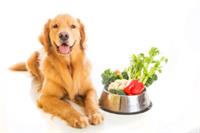What Does “Natural” Mean in Pet Food?

With one of the trends in veterinary medicine indicating a preference towards the use of natural and/or organic pet food, all clinic members should be prepared to discuss these products with clients.
The pet food industry has developed standards to help determine which manufactured foods meet the needs of our pets. One of the first steps to prepare for client discussion should focus on the misconceptions that surround the words “natural” and “organic” when they are used in connection with pet food.
Natural Pet Food Products
What the term “natural” on a pet food label implies:- A pet food product that is wholesome and nutritious, and made of whole, unprocessed or unaltered ingredients.
The Association of American Feed Control Officials (AAFCO) is involved in the production, labeling, and sale of animal food. According to their definition, the term “natural” refers to:
- “A feed or ingredient derived solely from plant, animal or mined sources, either in its unprocessed state or having been subjected to physical processing, heat processing, rendering, purification extraction, hydrolysis, enzymolysis or fermentation, but not having been produced by or subject to a chemically synthetic process and not containing any additives or processing aids that are chemically synthetic except in amounts as might occur unavoidably in good manufacturing practices.”
When labeling a product as “natural,” AAFCO suggests the following guidelines for pet food manufacturers:
- Reference of the term is only acceptable to the product as a whole when all of the ingredients and their components meet the definition
- A label that uses the term “natural” is false and misleading if any chemically synthesized ingredients are present in the product
- This includes the known common pet food ingredients Propylene Glycol and butylated hydroxyanisole (BHA)
- AAFCO does exclude certain synthetic vitamin and mineral additives in products that are not used as a dietary supplement.
The term “natural” on a product label may merely indicate that the product was minimally processed and grown in a natural environment, and may also contain artificial ingredients and additives.
Organic Pet Food Products
What the term “organic” on a label implies:- Products labeled as organic have not been exposed to pesticides
- The animals used in meat products were raised out-of-doors with free-range abilities
- Organic food is better for you
- Organic food is better for the environment
- Products labeled organic are inspected to guarantee their purity
- Imported products labeled as “organic” meet U.S. standards.
The U.S. Department of Agriculture (USDA) defines and regulates the conditions when pet and human food companies can used the term “organic.” USDA states that “organic” refers to the way that a crop or animal is raised, handled, and processed. Products correctly labeled “organic” are made from:
- Crops grown on land that has been pesticide free for at least three years
- Animals that were fed organic feed, and not with grain from pesticide-treated fields
- Animals that were free of antibiotics or hormones
- Animals that were raised with access to the outdoors.
What veterinarians and clinic staff should know:
Not all products that are labeled are made entirely of organic ingredients. When considering organic pet food, look for the USDA organic seal on the product package. Pet food products must contain 95% to 100% organic ingredients to receive the USDA organic seal, but there are four levels that define organic:
- 100% Organic
- Organic
- Made up of 95% organic ingredients
- Made with Organic
- Product contains 70% to 95% organic ingredients
- Less than 70% Organic
Clients often mistakenly believe that the terms natural and organic mean the same thing and that pet food products with these labels are always the healthier choice. Veterinarians and clinic staff aware of the regulations and proper label use of pet food products will be able to clear up these misconceptions in order to help clients determine the right food selection for their pet.
Purina provides the following information to share with clients concerned with the diets of their pets:
- All Purina Pro Plan Veterinary Diets are based off AAFCO Feeding Tests
- Purina’s therapeutic nutrition is backed by veterinarians and pet nutritionists, and manufactured in Purina-owned facilities.
- If a clinic wants to recommend a “Natural” diet for their clients’ pets, Purina has several options including the new Veterinary Exclusive EN Naturals Canine and Feline Formulas. These formulas meet the AAFCO definition of Natural and are also formulated without corn or wheat.
For more tips about other animal health issues, contact your Covetrus representative today at 855.724.3461.
Sources:http://www.petfood.aafco.org/Organic.aspx
http://www.fda.gov/AnimalVeterinary/Products/AnimalFoodFeeds/PetFood/default.htm
Need Regulatory Assistance
If you need help with regulatory or licensing issues, we're happy to help. We have a wide variety of resources to help you when issues arise.

Careers
Are you looking for a place to let your talents shine? At Covetrus, we help our practitioner customers better serve their patients and take pride in providing the best customer experience possible. Search our open positions to see our available opportunities.
Newsletter
Stay current with what’s going on with Covetrus, subscribe to receive our newsletter and email communications. Subscribers will receive the latest information in practice management, sales and marketing, animal health, and more.


Leave a comment